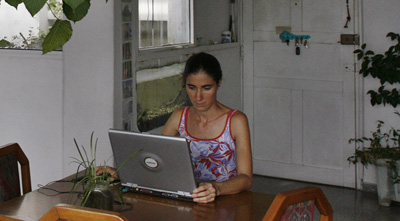Cuban blogger Yoani Sánchez was astounded this week by President Barack Obama’s decision to respond a written questionnaire Sánchez submitted to the White House. Still recovering from bruises left by a recent vicious attack by state security agents, she told CPJ from her home in Havana: “This is the best way to get better.”
The blogger said that she had tried for months to reach the U.S. president through different channels. Sánchez said she had sent written questions to Obama through a wide range of different people before the White House responded. On her blog Generación Y, where she has posted Obama’s answers to her seven questions, Sánchez explained that the questions were based on issues “that keep me from sleeping,” and were born from her personal experience.
“It was a very pleasant surprise,” Sánchez said, acknowledging that the chances that Obama would reply were minimal. Before responding to the questions, Obama thanked Sánchez for the opportunity to exchange views with her and her readers in Cuba, and congratulated her for receiving Columbia’s University Maria Moors Cabot Award for excellence in Latin American reporting.
“Your blog provides the world a unique window into the realities of daily life in Cuba,” Obama wrote. “It is telling that the Internet has provided you and other courageous Cuban bloggers with an outlet to express yourself so freely, and I applaud your collective efforts to empower fellow Cubans to express themselves through the use of technology. The government and people of the United States join all of you in looking forward to the day all Cubans can freely express themselves in public without fear and without reprisals.”
Sánchez asked Obama questions that ranged from U.S. foreign policy toward Cuba, to the legitimacy of President Raúl Castro and the potential involvement of the Cuban exile community, the political opposition, and nascent civil society groups.
Sánchez also raised the issue of limited Internet access in Cuba, asking whether the U.S. embargo has anything to do with it. Obama responded by saying that his administration has taken steps “to promote the free flow of information to and from the Cuban people particularly through new technologies.” But Obama warned that this will not have its full effect without action from Cuba. “I understand the Cuban government has announced a plan to provide Cubans greater access to the Internet at post offices,” said Obama. The president urged the Cuban government “to allow its people to enjoy unrestricted access to the Internet and to information.”
When Sánchez asked if he would be willing to travel to Cuba, Obama said he “would never rule out a course of action that could advance the interests of the United States and advance the cause of freedom for the Cuban people.” Surprising to Sánchez was that Obama said that the U.S. “has no intention of using military force in Cuba.”
Sánchez, who has received several international awards and blogs regularly for the U.S.-based Huffington Post, said she was satisfied by Obama’s responses, which she described as cautious, moderate, and diplomatic. She has also sent a series of questions to Raúl Castro, but hasn’t received a response yet.
In a recent report, CPJ described the emergence of a vibrant independent blogging community in Cuba. Despite severe legal, economic, and practical restrictions the number of independent journalism blogs has grown since the first few emerged in 2007, CPJ research has found. The bloggers, mainly young and from a variety of professions, critically examine the issues that Cubans face daily: food shortages, health care, education, housing problems, and the lack of Internet access.
Free press advocates and Cuban journalists point to Sánchez as a pioneer in this evolving blogging community. Sánchez, who started blogging in April 2007, was the first to write under her own byline. Generación Y and six Cuban blogs are hosted by the German-based portal Desde Cuba (From Cuba), a place where, as its introduction says, “citizen journalists” can offer “opinions that don’t have room in official Cuban outlets or any other publication that is conditioned by political requirements.”
